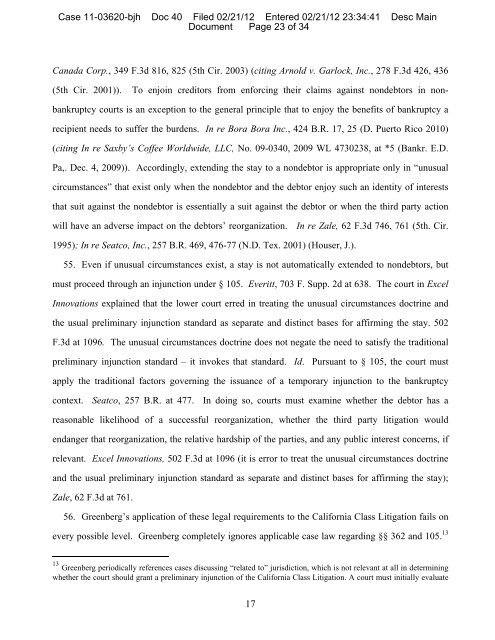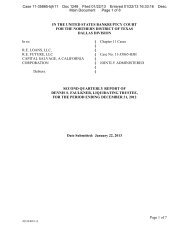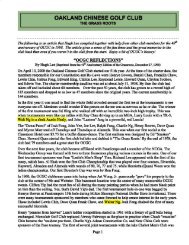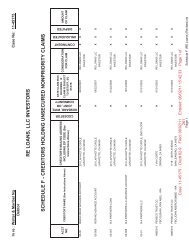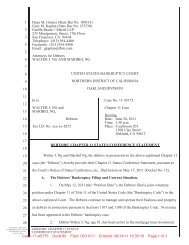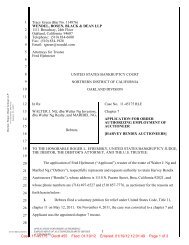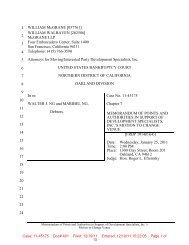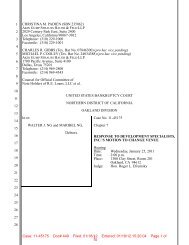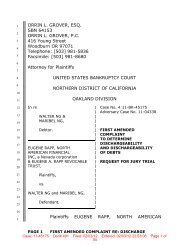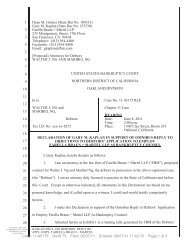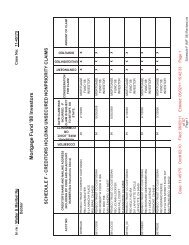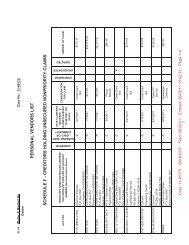Class Plaintiff's Response to Automatic Stay - equitatus
Class Plaintiff's Response to Automatic Stay - equitatus
Class Plaintiff's Response to Automatic Stay - equitatus
Create successful ePaper yourself
Turn your PDF publications into a flip-book with our unique Google optimized e-Paper software.
Case 11-03620-bjh Doc 40 Filed 02/21/12 Entered 02/21/12 23:34:41 Desc Main<br />
Document Page 23 of 34<br />
Canada Corp., 349 F.3d 816, 825 (5th Cir. 2003) (citing Arnold v. Garlock, Inc., 278 F.3d 426, 436<br />
(5th Cir. 2001)). To enjoin credi<strong>to</strong>rs from enforcing their claims against nondeb<strong>to</strong>rs in nonbankruptcy<br />
courts is an exception <strong>to</strong> the general principle that <strong>to</strong> enjoy the benefits of bankruptcy a<br />
recipient needs <strong>to</strong> suffer the burdens. In re Bora Bora Inc., 424 B.R. 17, 25 (D. Puer<strong>to</strong> Rico 2010)<br />
(citing In re Saxby’s Coffee Worldwide, LLC, No. 09-0340, 2009 WL 4730238, at *5 (Bankr. E.D.<br />
Pa,. Dec. 4, 2009)). Accordingly, extending the stay <strong>to</strong> a nondeb<strong>to</strong>r is appropriate only in “unusual<br />
circumstances” that exist only when the nondeb<strong>to</strong>r and the deb<strong>to</strong>r enjoy such an identity of interests<br />
that suit against the nondeb<strong>to</strong>r is essentially a suit against the deb<strong>to</strong>r or when the third party action<br />
will have an adverse impact on the deb<strong>to</strong>rs’ reorganization. In re Zale, 62 F.3d 746, 761 (5th. Cir.<br />
1995); In re Seatco, Inc., 257 B.R. 469, 476-77 (N.D. Tex. 2001) (Houser, J.).<br />
55. Even if unusual circumstances exist, a stay is not au<strong>to</strong>matically extended <strong>to</strong> nondeb<strong>to</strong>rs, but<br />
must proceed through an injunction under § 105. Everitt, 703 F. Supp. 2d at 638. The court in Excel<br />
Innovations explained that the lower court erred in treating the unusual circumstances doctrine and<br />
the usual preliminary injunction standard as separate and distinct bases for affirming the stay. 502<br />
F.3d at 1096. The unusual circumstances doctrine does not negate the need <strong>to</strong> satisfy the traditional<br />
preliminary injunction standard – it invokes that standard. Id. Pursuant <strong>to</strong> § 105, the court must<br />
apply the traditional fac<strong>to</strong>rs governing the issuance of a temporary injunction <strong>to</strong> the bankruptcy<br />
context. Seatco, 257 B.R. at 477. In doing so, courts must examine whether the deb<strong>to</strong>r has a<br />
reasonable likelihood of a successful reorganization, whether the third party litigation would<br />
endanger that reorganization, the relative hardship of the parties, and any public interest concerns, if<br />
relevant. Excel Innovations, 502 F.3d at 1096 (it is error <strong>to</strong> treat the unusual circumstances doctrine<br />
and the usual preliminary injunction standard as separate and distinct bases for affirming the stay);<br />
Zale, 62 F.3d at 761.<br />
56. Greenberg’s application of these legal requirements <strong>to</strong> the California <strong>Class</strong> Litigation fails on<br />
every possible level. Greenberg completely ignores applicable case law regarding §§ 362 and 105. 13<br />
13 Greenberg periodically references cases discussing “related <strong>to</strong>” jurisdiction, which is not relevant at all in determining<br />
whether the court should grant a preliminary injunction of the California <strong>Class</strong> Litigation. A court must initially evaluate<br />
17


